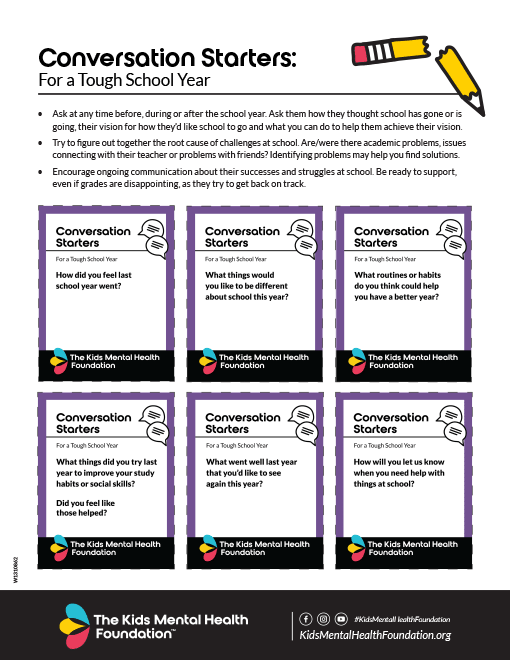- Getting to know your class and encouraging students to get to know one another can improve classroom belonging.
- Asking open-ended questions can be a great way to get everyone to share.
- While you can encourage all students to participate, try to avoid making a student answer a question they’re not comfortable with.
Preparing for a New School Year When Last Year Didn’t Go Well
Article Summary
- It’s not unusual for some kids to struggle academically; often, it can cause extra pressure to catch up.
- Parents and caregivers can help prepare their children who struggled last year by having conversations and making plans to address the child’s needs for this upcoming year.
As the end of summer approaches, the stress of starting a new school year rises. It’s common for parents and children to feel some stress with the anticipation of a new school year. For others, they may feel dread, given how badly last year went.
Many students in the U.S. continue to struggle academically in reading and math. According to the National Assessment of Educational Progress (2024), many students have not regained what was lost during the pandemic and some continue to fall further behind. The students who seem to be doing the worst are those who were already struggling.
When children struggle at school, it can cause them to act out, avoid school altogether and can negatively impact their mental health. If last year was difficult for your child, these ideas may help you prepare them for a better year:
- As soon as you can, start talking about the upcoming year. Ask your child what worked well last year and what was challenging, using the conversation starters you can download below.
- Help your child establish routines. Develop the plan of action together, with their input. They’ll be more likely to follow through if they help create the plan.. Develop the plan of action together, with their input. They’ll be more likely to follow through if they help create the plan.
- If your child needs extra help, look for a tutor or an academic specialist. See if your public library or students in high school clubs and organizations offer free tutoring. Your school counselor may be able to point you toward resources.
- Let your child know that you want to help when they’re struggling. Some kids hesitate to tell their parent or caregiver when they’re having trouble because they think they’ll disappoint their family or get punished. Create an open dialogue to problem-solve together.
- Contact your child’s new teacher before school begins, and stay in touch. Let them know what your child struggled with last year and what might help them succeed this year.
- Praise your child’s efforts to do better. This might be acknowledging them trying more with their homework or organization. Show them that you’ve noticed their improvements, even if they haven’t met their goals yet.
- Find activities outside of school where your child can have positive experiences and build connections. Some kids thrive on sports teams, clubs or religious groups.
When should I be concerned?
Visit your child’s pediatrician or a mental health professional if your child’s anxiety or stress levels seem dramatically different when you talk about school. It’s normal for kids to complain when summer is about to end, but if their overall outlook changes, they may need to see someone.
A challenging school year can be hard for kids to know how to overcome. Talking with your child can help both of you to come up with a plan for moving forward.
Ready to start talking to your child about a tough school year? Download these conversation starters to help you know what to ask and how to do it.
References
Betthauser B, Bach-Mortensen A, Engzell P. A Systemic Review and Meta-Analysis of the Evidence on Learning During the COVID-19 Pandemic. Nature Human Behaviour. 2023;7:275-285.
Jones J. The Dual Pandemics of COVID-19 and Systemic Racism: Navigating Our Path Forward. School Psychology. 2021;36:427-431.
National Center for Education Statistics. More than 80 Percent of U.S. Public Schools Report Pandemic Has Negatively Impacted Student Behavior and Socio-Economic Development. Accessed July 2023. https://nces.ed.gov/whatsnew/press_releases/07_06_2022.asp
Education NC. Perspective: New Research Shows Uneven Impacts of Pandemic on Student Attendance and Grades. EdNC. Accessed July 2023. https://www.ednc.org/perspective-new-research-shows-uneven-impacts-of-pandemic-on-student-attendance-and-grades/
Saulle R, De Sario M, Bena A, Capra P, Culasso M, Davoli M, De Lorenzo A, Lattke L, Marra M, Mitrova Z, Paduano S, Rabaglietti E, Sartini M, Minozzi S. School Closures and Mental Health, Wellbeing and Health Behaviours Among Children and Adolescents During the Second COVID-19 Wave: A Systemic Review of the Literature. Epidemiologia & Prevenzione. 2022;46:333-352.
 Copy Link
Copy Link




